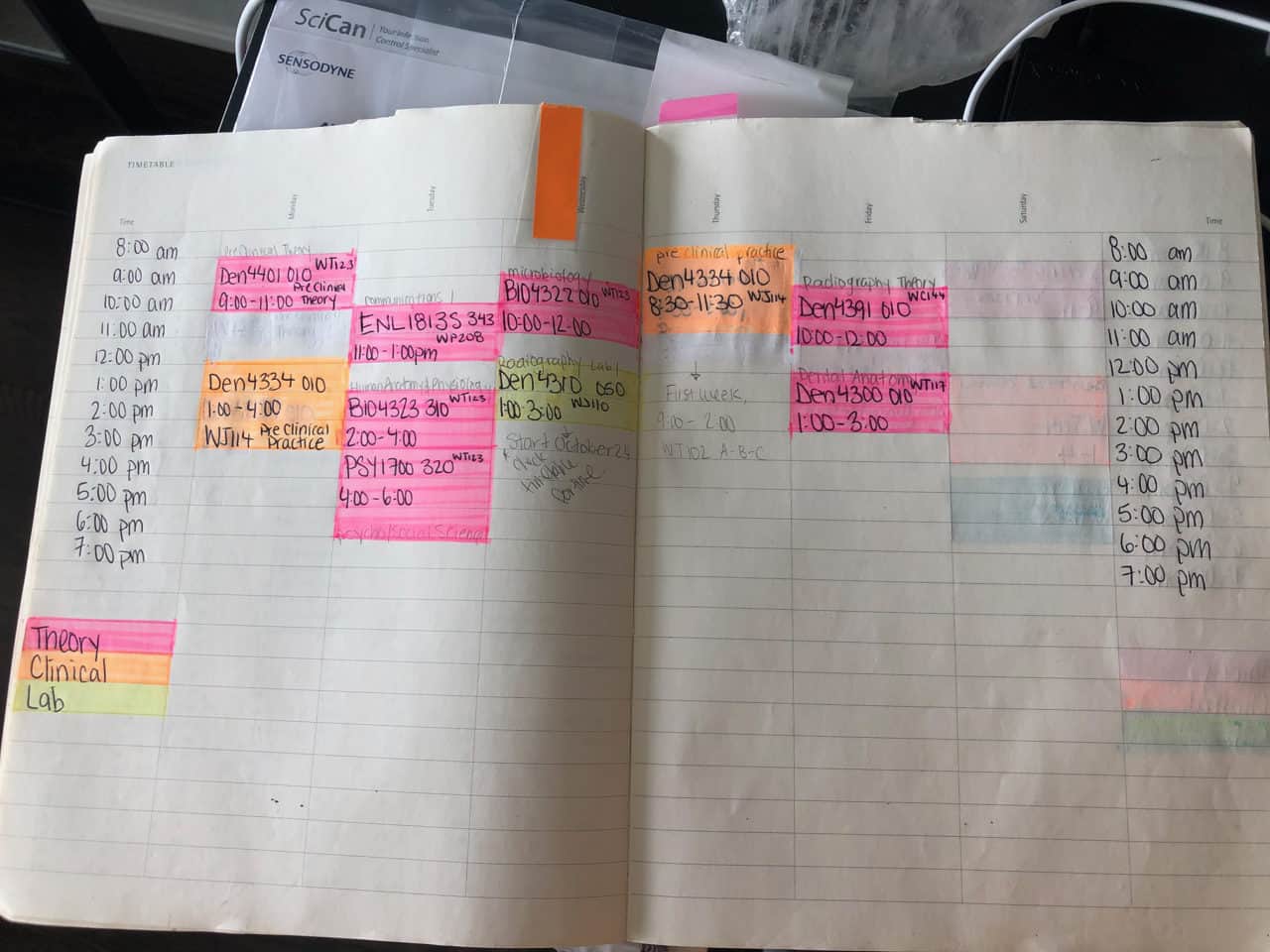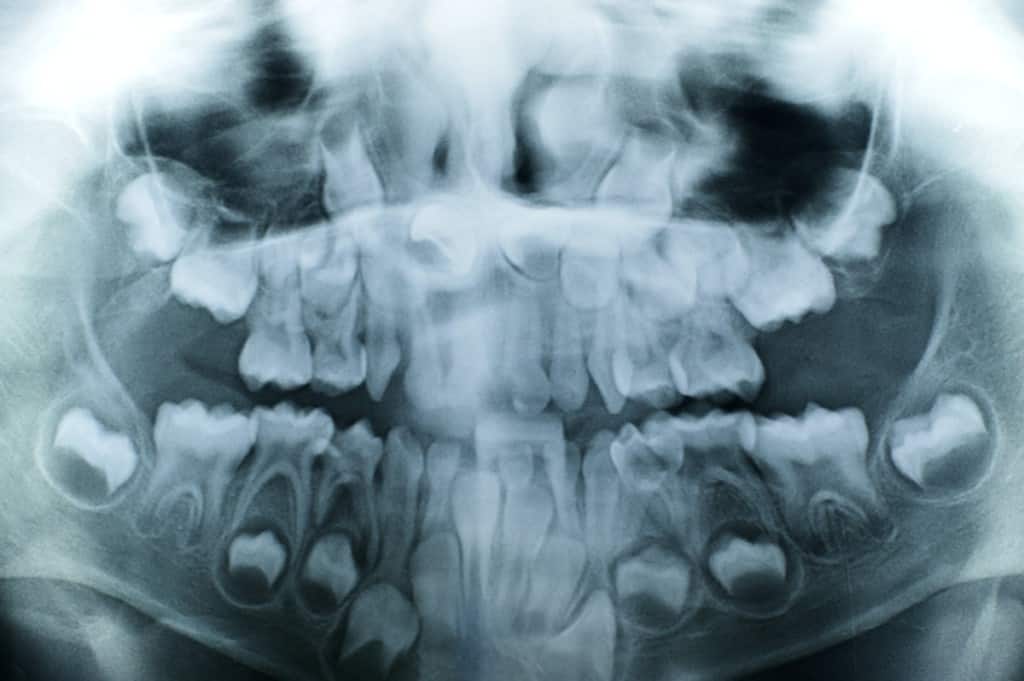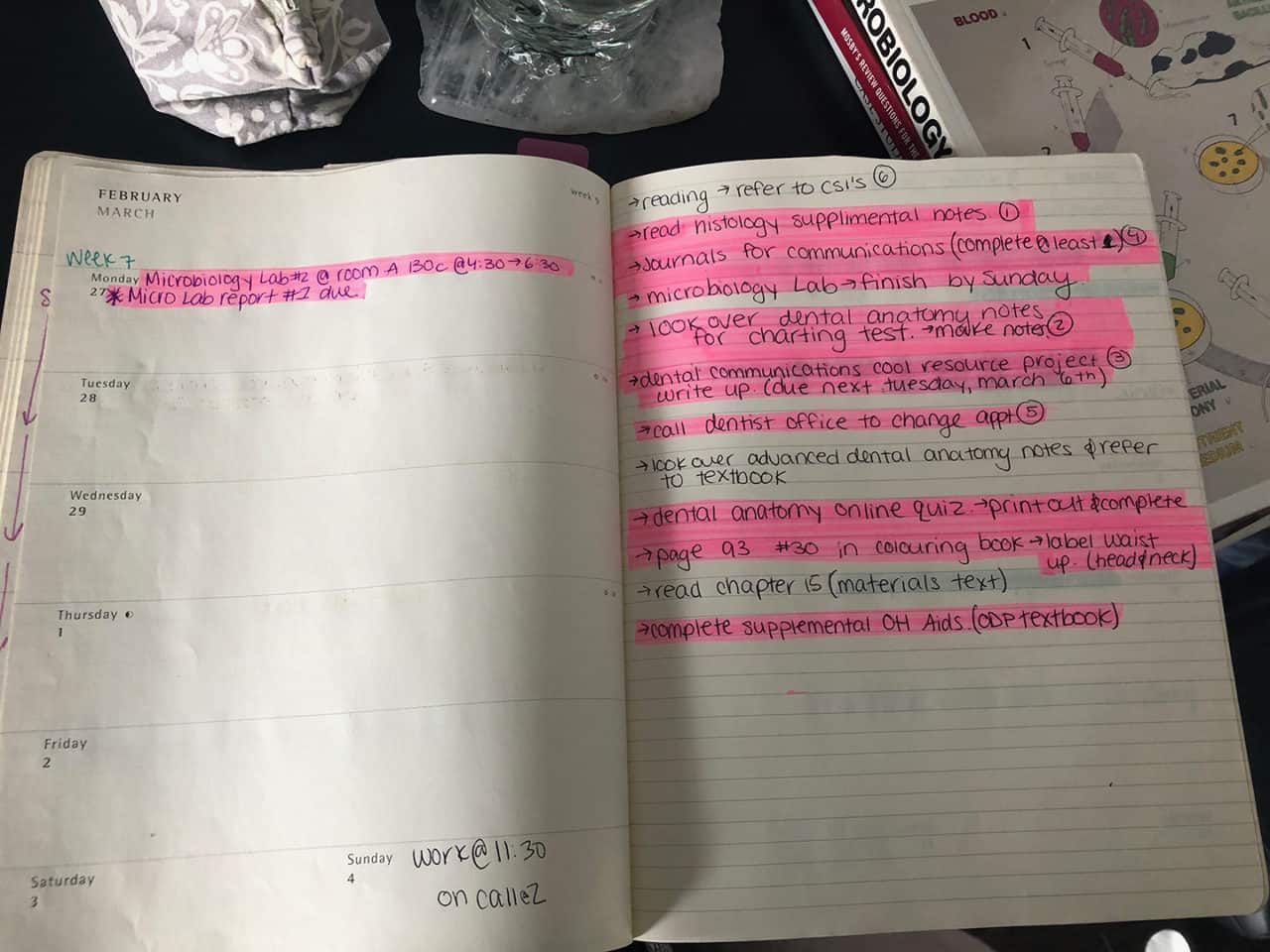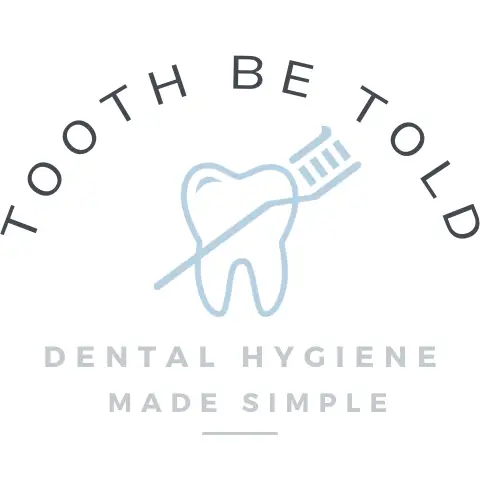
Interested in becoming a dental hygienist but worried about how hard it is? I believe that the key thing to keep in mind is your passion. No matter how hard something is or how easy it may be, it’s your passion that will keep you motivated to keep you going.
Dental hygiene school is both mentally and physically difficult. You need to have very good time management, interpersonal, communication, and problem-solving skills. DH school is very fast-paced, with many classes per semester, and clinics, requiring many hours of studying outside of school hours.
I remember loving the material that we were learning (other than the English classes and the longer papers we needed to write). But as a whole, as hard as it was for me, I loved it so much. Below in this post, I go through my personal view on how hard dental hygiene school is and what I did to manage school and graduate with honours.
How hard dental hygiene school really is
I look back at my dental hygiene school journey and sometimes wonder how I pulled it off. The long nights staying up and studying, long school days, and a few tears along the way.
Don’t let that scare you! Anything we work hard at and care about can cause us stress! I believe every tear was worth it, and it made me into the hygienist I am today.
Your life and everything involved in it will contribute to how hard dental hygiene school can be. Do you work long hours or have a busy schedule that is not flexible? Do you have dependents? Also, your learning style can all impact how much time you can allocate to focusing on school.
Dental hygiene covers a lot of topics and a lot of information, and not to mention, you are basically learning a new language, dental language. You need to be able to take everything you have learned and apply it to your daily practice.
Dental hygiene is long hours, both in school and out. Depending on your school, things may be organized differently in the curriculum. Here in Canada, we all have to write the same national board exam and graduate with the same competencies no matter what school we go to.
I am making the point that you need to be dedicated and study hard.
Maybe I don’t remember the actual name of a certain cell structure that I learned many years ago when I was in school. But I take the overall knowledge, and I use it every day.
When working as a registered dental hygienist, you need to know your stuff as your patients will be asking you lots of questions, and their health is in your hands.
Clinics
School clinics were my top source of stress when I was in school. I wanted to be perfect and do a great job! My perfectionism sometimes got in the way of how quickly I could get things done, but mostly it drove me always to be as prepared as I could and to ask lots of questions.
I remember how nervous I was for my first-ever patient!
Clinics are like getting a taste of real-world practice, but with a few differences. Clinics are long and tedious because it takes time to learn the steps of treatment, but also you have a clinician who is responsible for you.
One clinic would be around 3 hours long for one patient, and sometimes it would take up to 3 appointments for that one patient!
Classes

Some semesters will be overloaded with courses, but don’t let that scare you! It can seem overwhelming, especially when you have 10 classes per semester, but I found that when I organized myself and had things planned out, I was more prepared and a better student.
The more you are organized and have all your ducks in a row, the better you will do. This Moleskin Agenda (linked on Amazon) was one of the biggest reasons for my success because it kept me SO organized.
(linked on Amazon) was one of the biggest reasons for my success because it kept me SO organized.
The classes range from science, business, population health, and psychology to research. I found that the content was not too difficult, but rather the amount of homework/projects/papers, on top of attending classes and clinics, to be the most stressful.
Labs

Labs were pretty easy and a nice change from clinics and classes. We had a radiography lab where you learned how to take radiographs (also called x-rays). We called it RAD LAB for short. We learned how to use and take film and digital radiographs that could later be applied to working on clinic patients.
Read now: Dental Hygiene: Are X-Rays Needed for Teeth Cleaning?
We first practiced on dummies that had real teeth and jawbones. The jaws were from people who had passed away, and their jaws had been given to science. This is because teeth and jawbones have a certain structure and appear a certain way on the x-ray that we need to learn. No other substance or thing can replace the real thing.
If you are still wondering if you have what it takes to be a great dental hygienist, below, I have listed 17 character traits that make a great dental hygienist! 🙂
17 Character traits that make a great dental hygienist
Not everyone is cut out for the job, but some people just possess the knack for it. Dental hygiene is a very well-rounded career that demands a lot from us.
I would say if you have most of the following character traits, you have the potential to be a fantastic dental hygienist.
- Detail-oriented
- Hard-working
- Self-directed
- Think critically
- Empathetic and caring
- Great time managers
- Committed/Passionate
- Confident
- Problem solver
- Great organizational skills
- Have humour
- Optimistic
- Great interpersonal and interprofessional communications
- Be professional
- Willing to learn throughout the entire career
- A team player
- A good listener
If you don’t have all these qualities, don’t worry, you don’t need all of them. But the more you have, the more suited you are to be a dental hygienist.
But also, be aware if you easily experience burnout or become very overwhelmed!
If you want to know about burnout as a dental hygienist, the post linked below will give you all that information.
Read Now: Dental Hygienist Burnout; Causes, Prevention, Burnout Rate
Tips to help get you through dental hygiene school
Have a large planner/agenda
As I mentioned earlier in this post, my Moleskin Agenda saw me through school and kept me organized.
Staying organized with a planner/agenda was my lifesaver. I had all my checklists of projects and upcoming exams in one place.
This was great for organization and the mental benefits of checking off my to-do list. Seeing the progress and getting stuff done made me feel so much better.

Nothing beats a Moleskin agenda, EVER! With the week outlined on the left of the page and a notes page on the right was a lifesaver, as I was able to have all my due dates on the week and the to-dos on the right.
Organize your time
For me, I found that even though school was difficult, I am pretty introverted and like to study and learn. It wasn’t so much the difficulty of the course content. It was juggling the huge course load and becoming an expert in time management.
This feeds from having an organized planner/agenda. I would block off all the time that I needed for projects and study time, and I even blocked out time to spend with friends and family.
You may think that that can sound a little OTT to schedule as much as you can, but honestly, it helped me keep on track, even if I strayed a little from the plan. Straying is okay because sometimes the best memories come from things that aren’t planned (and you still need to enjoy life a little bit)!
Study at school
It was so easy for me to go home and tell myself that I would study, but my procrastination tendencies always came to haunt me more at home. I could get a lot more studying done… something about getting a Starbucks coffee and heading to the quiet study area made me go into study mode.
The college I went to had quiet study rooms where you had to be quiet. No group work, no loud music, no sound. It was great for me!
I wish noise-cancellation headphones were around when I was in school because I am in love with them now! They allow me to focus when I am reading or working on my laptop and not get distracted.
Collaborate
Bouncing off of classmates and teachers can keep you on track but also make you feel like you are not alone in your journey. I found that sometimes I would get so overwhelmed with the amount of stuff I had to do to keep on track with school, but as soon as I talked to somebody, it made me feel so much better!
Go digital
When I was going through hygiene school, e-textbooks were just becoming a thing. I always thought I was an on-paper type of person, with my brain being able to remember things in a textbook if I colour-coded with highlighters and physically wrote things down in my textbooks.
Now that I look back and reflect, the advancements in technology have made e-textbooks much better than they were! I think having all your textbooks online and taking notes digitally not only keeps everything in one place. You can quickly search up terms, and also allows you to study on the go without breaking your back carrying textbooks around!
But this is not for everybody, as some people learn and retain more information in different ways.
Shadow/volunteer at your local dental office
Ask to shadow at your dental office. You may realize that it is not the job for you, or it will make you hungry for more, hungry to learn and get through school and start practising!
It will also allow you to make contacts in the industry. Sometimes it comes down to not what you know but who you know.
This is why shadowing at a dental office and making connections with people in the industry is so important. There have been so many instances where I know of an office looking for a new hire, and the first thing they do is ask around before even posting the job online!
Dental Hygiene Income – what to expect right after graduating
Getting a job right out of school can be intimidating, and sometimes we sacrifice the wages we deserve to get a foot in the door. Many hygienists told me not to cut myself short, but the reality is that you need the job. Negotiate within reason and keep it fair.
The people hiring you will respect that you want to be paid fairly (unless they are cheap and you don’t want to work for them).
Income can vary depending on where you live, your job, and your experience.
Here in the capital city of Canada, Ottawa, has a pretty fair wage. At the moment, the starting wage for a recent grad is about $28-32 an hour, and for experienced hygienists, you can get around $40-55 an hour, and I have seen $65 for desperate dental offices.
But it would be best if you asked around and researched the wage opportunities in your local area. Sometimes taking a look at the job postings will give you a ballpark.
I really hope that all this information can help you!
Keep smiling,
Holly 🙂

